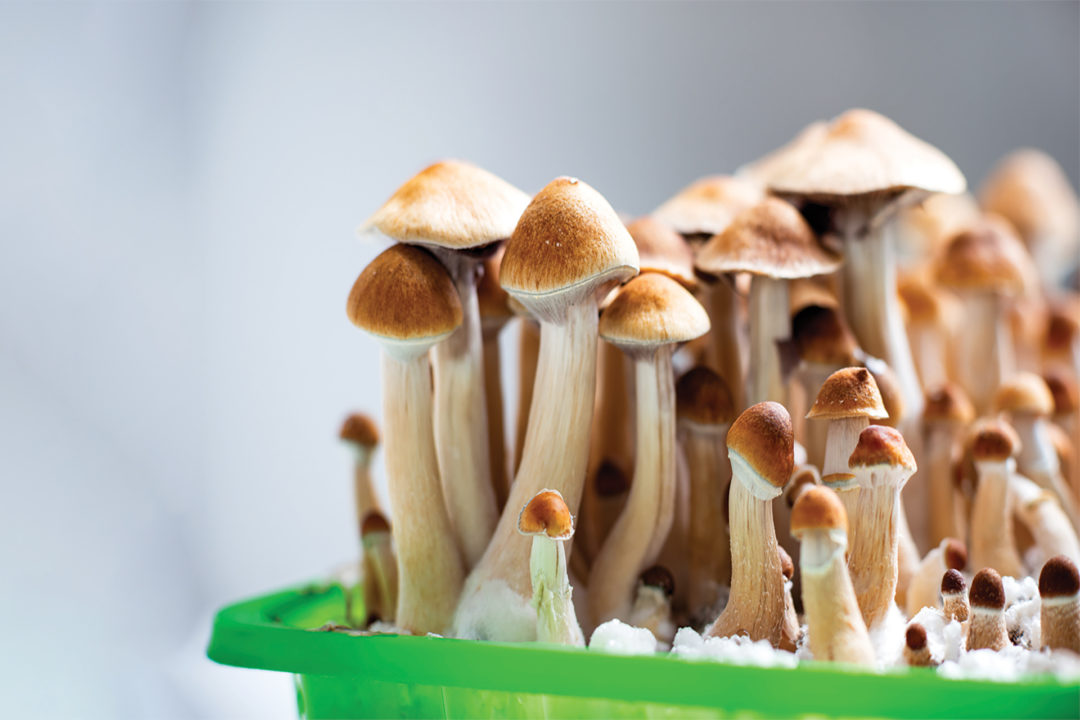Psychedelics are moving into the spotlight through decriminalization bills in Oregon and California—but there’s still a gap in understanding and in acceptance. Naturally Informed did its part to address this issue via education at theMental Wellness: Mastering the Marketevent in 2021. David Bronner, Cosmic Engagement Officer (CEO) of Dr. Bronner’s, a strong supporter of psychedelics, gave the presentationPsychedelic Therapy: Healing Hearts, Minds, and Souls. Bronner’s support of psychedelics comes in part from personal experience: “In my own life, I’ve experienced the power of psychedelic medicine in helping me connect with the transcendent ground of love and light at the heart of existence, which helped me realize that my granddad Dr. Bronner was 100% right: All the faith traditions are pointing at this transcendent ground, and even with all the suffering and absurdity and tragedy in life, that that is in fact the truth.”
That isn’t, however, why psychedelics are getting attention, or how they’re being built up in the public eye, Bronner shared: “What I was just talking about was more of a spiritual experience, but that’s not generally your crossover message.” Rather, the message is about the therapeutic potential that these medicines can offer. For instance: psilocybin. “Psilocybin is the active ingredient in ‘magic mushrooms’—it has a long history, millennia with the Mazatec tribe in Mexico,” Bronner said. “In clinical trials it’s been shown to be incredibly effective for people with treatment-resistant depression, debilitating end-of-life anxiety, with addiction and substance use disorders of all kinds.”
Looking at how psilocybin does what it does, Bronner explained: “What’s happening at the neurological level, what appears to be happening with psilocybin and classic psychedelics, including MDMA and LSD—it’s what’s called the default mode network, which kind of corresponds to ego function, executive function, linear time, logic, making sure you’re on top of your stuff, all the anxieties and dealing with life, but it also just completely takes for granted the miracle of life, all around us all the time. And it dismisses all of that. It’s goal- and task-oriented. As we all know, we can get into obsessive thought loops, and through traumas in our lives and in early childhood or just genetic disorders, people can be really trapped in self-destructive patterns of thoughts and behavior. What psychedelic therapy seems to be able to do is break those patterns. It’s like hitting reset, and you have this incredible experience of entering the now, shutting down that ego-consciousness. They’ve done brain scanning on deep meditators in deep meditative states, and there’s commonality with peak psychedelic experience, in terms of what’s happening in the brain—it corresponds to these states of consciousness where just incredible healing and love can be experienced and a new perspective can be gained. For instance, the way we die in our culture is not nice, oftentimes it’s parking our elderly in convalescent homes, which isn’t good. We’re getting better with palliative care and physical pain, but psychological pain not so much, and psilocybin shows so much potential for people facing debilitating end-of-life anxiety, to reconcile to the larger reality process we’re all part of, where death is just a part of something way bigger. It’s really healing to encounter that power and that love, and live out the rest of your days with a much higher quality of life and appreciating time with your family and loved ones.”
Nor is psilocybin the only psychedelic garnering interest for therapy. Bronner gave the low-down on MDMA, too: “MDMA, when used as an adjunctive therapy, is really great for treatment-resistant PTSD. Generally, mental illness is not being treated adequately by standard Western pharma and therapeutic approaches. FDA, recognizing this, is giving breakthrough status to both MDMA therapy and psilocybin therapy. And what MDMA appears to do is tamp down the amygdala, the fear center of the brain, and allow extremely traumatic events to be processed. It’s still very difficult work that people go through, but they’re able to do it without retraumatizing themselves, and they’re able to accept and move forward with their lives, and consolidate these memories in a more normal memory structure where it’s not viscerally retraumatizing every single time you get remotely close to that memory. MDMA is going to move into the culture via FDA approval process.”
However, psychedelics don’t typically have this therapeutic benefit when misused—and Bronner told attendees that in this case, misuse doesn’t mean overuse, but, rather, a failure to prepare. “In all cases, here, there’s careful preparation, facilitation, and integration, this is very intentional work,” he said, pointing to the idea of a therapeutic container: a structure surrounding these experiences that allows the patient to feel safe, requires the patient to be informed about the program, guarantees purity and potency of the medicine, and offers support and guidance from trained clinicians and facilitators. “The therapeutic containers are in some ways a Western analogue of the Indigenous ceremonial container. In Indigenous cultures you never ever take medicine outside of that container, the way psychedelics were taken in the 60s, all over the place and a lot of times casually. Personally speaking, that can be really rewarding out in the forest or at home, but if you’re surrounded by people and you haven’t put a lot of intention in and the environment is out of control, it can just go sideways and/or be relatively superficial. But with proper intention and preparation and a good facilitator holding the space, allowing you to really release in your experience—incredible results can be had.”
His key takeaway: “There’s a huge education gap. We are living through a psychedelic renaissance. Many medicines and psychedelic therapies are getting more traction, but in the culture—we’re destigmatizing, but there’s further to go.”
For more, register atwww.NaturallyInformed.netto view the Mental Wellness event—Bronner’s talk is available on-demand, and this overview barely covers a quarter of his insights.WF

2025 Natural Choice Awards
March 31, 2025








